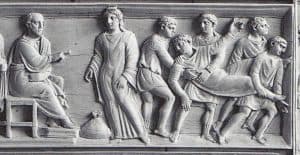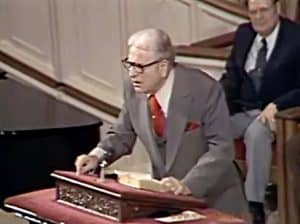Even though Christianity does not espouse a given economic ideology, it would be quite erroneous to conclude that therefore [just] any economic ideology is compatible with Christian values and beliefs. Such a conclusion, however, is often made, especially by those who look favorably upon socialism.
—Alvin J. Schmidt1—
What about the reference in the book of Acts to the early Christians selling their worldly goods and sharing communally in the proceeds? That sounds like a progressive utopia. On closer inspection, however, it turns out that those early Christians did not sell everything they had and were not commanded or expected to do so. They continued to meet in their own private homes, for example.
—Lawrence W. Reed—
Key point: Any economic system that denies the right of human freedom stands in opposition to the principles of Christianity and is destined to fail.
To access additional Word Foundations articles on social justice, go here.
Last time we noted that Acts 2:44-45 and 4:34-35 often are used by advocates of socialism and “social justice” in making the case that the Bible teaches socialism. After defining a few terms, we then launched a fact-finding mission to see if God’s Word really does what social justice warriors (SJWs) claim. One of the first steps in our quest was to establish Exodus 20:15,17; Acts 2:40–5:11; and 6:1-7 as the broad context for the four verses in Acts SJWs so often cite.
To the SJWs we are compelled to say, Wait! Not so fast! Here are some very important considerations.
 First, while God’s ceremonial law was about to be phased out, His moral law would remain. Keeping the law isn’t a means to salvation, but it is a result of being saved. Of course, God’s moral law includes the Eighth and Tenth Commandments, “You shall not steal,” and “You shall not covet.” Both of these commands uphold individual property rights. Property rights are non-existent in socialist countries and groups.
First, while God’s ceremonial law was about to be phased out, His moral law would remain. Keeping the law isn’t a means to salvation, but it is a result of being saved. Of course, God’s moral law includes the Eighth and Tenth Commandments, “You shall not steal,” and “You shall not covet.” Both of these commands uphold individual property rights. Property rights are non-existent in socialist countries and groups.
Second, an event that Scripture records is not necessarily an event that Scripture approves. More specifically, just because the early church did a particular thing does not mean the practice represents God’s ideal. As we will see, evidence is strong that the common store established to meet needs in the early church gave rise to some very serious problems.
Third, socialism negates generosity, something Scripture commands. Whatever the fallacies of the “common store approach” the early church briefly adopted, it rested on the generosity of church members, who responded graciously and wholeheartedly.
Our fourth item is closely related to item #3. Donations in the early church came freely and voluntarily. With socialism, “donations” to the treasury really aren’t donations at all. They are taxes orchestrated and collected by the state or by some other authority.
It is difficult to overstate the importance of this point. Sociologist and historian Alvin Schmidt writes,
If we fail to understand that the involuntary, coercive nature of socialism and its state socialist programs is highly incompatible with the economic practices that some of the early Christians engaged in when they voluntarily ‘had all things in common’ (Acts 2:44, NKJV), we may think that socialism is a good way to practice Christianity.…[Yet] something that is done involuntarily or as a result of compulsion is no longer Christian.2
Anything done involuntarily or as a result of compulsion cannot be Christian.
—paraphrase of a statement made by Alvin Schmidt—
Fifth, the free and voluntary donations came from individuals and families who owned them privately. This harks back to the property rights affirmed in the Eighth and Tenth Commandments. Government was not involved; nor was the community of believers considered to be owner of anything that was not donated. (Later, in item 8, we will look again at the fact that the government had nothing whatsoever to do with the church’s activities, except possibly in an extremely minor, indirect way.)
We see a clear affirmation of private property rights almost precisely at this point in the early church, in Acts 5:1-11, from none other than the apostle Peter himself. When donations were being made to the common treasury, Ananians and Sapphira, a husband and wife in the early church, sold a piece of property and brought a portion of the proceeds to the apostles. They claimed they were bringing the entire amount but actually held a portion back. Their primary offense wasn’t failing to donate all of the proceeds, but lying about it. To their own peril, they lied to God Himself.

Peter confronted Ananias about his treachery, saying, “Ananias, why has Satan filled your heart to lie to the Holy Spirit and keep back part of the price of the land for yourself? While it remained, was it not your own? And after it was sold, was it not in your own control? Why have you conceived this thing in your heart? You have not lied to men but to God” (5:3-4, emphasis added). Both Ananias and Sapphira died premature deaths as a result of their deception.
Again, note carefully—it was their deception that cost them their lives, not a failure to give a certain amount. It is clear that people were not obligated to contribute to the treasury that was used to meet church members’ needs.
Sixth, giving occurred periodically, as various needs arose. In other words, this was not a pre-planned redistribution of wealth with equalization of resources among all parties as the goal, as we would expect with a true experiment in socialism.3 Rather, it was an effort—actually these were efforts—made among God’s people to meet real needs as they occurred within the body of Christ. The believers “sold their possessions and goods, and divided them among all, as anyone had need” (2:45, emphasis added). Acts 4:35 echoes this. “[T]hey distributed to each as anyone had need” (emphasis added).
The verb tenses in the text also are consistent with periodic giving and distribution. The New Testament in the Language of the People accurately reflects this important detail:
- “And so they continued to sell their property and goods and to distribute the money to all, as anyone had special need” (2:45, emphases added).4
- “For none of them was in want, for as many of them as were owners of farms or houses proceeded to sell them, one by one, and continued to bring the money received for the things sold and to put it at the disposal of the apostles; then distribution was continually made to everyone in proportion to his need” (4:34-35).5
Seventh, Luke did not report that everyone—or even that anyone—in the community of believers was claiming that the property of each belonged to all, as socialism dictates. Instead, Luke reported that no one said “that any of the things he possessed was his own” (4:32).6 The fact that (1) those who owned property didn’t consider it their own is very different from (2) those in need claiming ownership of property that wasn’t already theirs—an integral component of socialism.

Luke was highlighting the attitude of those who gave, as well as the commitment of believers to steward responsibly all God had entrusted to them. We see this same attitude among gracious hosts and hostesses today. If the lady of the house greets a family who has come to visit by saying, “Welcome to our home; what’s ours is yours,” she isn’t relinquishing ownership of her house and everything in it to her family’s guests. It’s especially true that she’s not relinquishing her family’s right to private ownership. She’s simply being hospitable and expressing the willingness of the family to meet immediate needs. This was the attitude of the believers who sold their property and brought the revenue to the apostles. They knew people were more important than property—and we need to realize this same thing today.7
Eighth, these gifts in the early church were spontaneous. By contrast, with socialism, taxation is orchestrated. Here no church leader or government authority concerned himself with administering resources to meet church members’ needs—until the gifts started coming in. At that point, management of the resources became a concern for the church leaders only—not the government.
What were the authorities in Jerusalem concerned about? They were persecuting the apostles for healing “a certain man lame from his mother’s womb” (3:2) and attributing the miracle to Jesus Christ. Peter declared that “by the name of Jesus Christ of Nazareth, whom you crucified, whom God raised from the dead, by Him this man stands here before you whole” (4:10; see 2:40-4:37 for the larger context). The authorities, therefore, were laser-focused on how to keep the apostles from speaking publicly in Jesus’ name.
Likewise, as we might expect, the apostles’ primary concern, and the church’s, was that the church and the individuals in it would “with all boldness…speak” the truth of God (see 4:29).
The persecution the authorities brought against the church drew church members closer together. With closer relationships, needs become known more readily, but that was the extent of the government’s involvement in the sharing of resources within the church.
Ninth, those who gave to meet the needs of fellow church members laid their donations “at the apostles’ feet” (4:35). That makes it a “slam dunk” that the church didn’t engage in socialism! In this 45-second audio clip from His sermon “The Bankruptcy of Socialism,” Dr. D. James Kennedy explains.

Tenth, the common store approach was not “ever repeated anywhere else.”8 Why? It simply didn’t work! In fact, it created all kinds of problems for the church and its leaders.
“Trouble! Trouble! Trouble!”
We saw a hint of the problems that arose as a result of the common store in Ananias’s and Sapphira’s attempt to deceive the church and the apostles (see item #5 and Acts 2:3–5:11). Did this couple want so desperately to “get in on the act” of donating proceeds from the sale of their land that they decided to try to mislead their fellow believers? In Acts 4:36-37, Luke writes that “Joses, who was also named Barnabas by the apostles (which is translated Son of Encouragement)” had just contributed proceeds from land he had sold. Barnabas clearly was well-known and well-liked in the early church. Did Ananias and Sapphira want to “make a name for themselves” as donors of a large amount? We cannot know with certainty, but neither can we dismiss this possibility.
Furthermore, in Acts 6:1-7, “there arose a complaint against the Hebrews by the Hellenists, because their widows were neglected in the daily distribution” (emphasis added). Is this more evidence of problems arising from the common store approach? While it is legitimate for the church to address widows’ concerns, their immediate family members should be the first to meet their physical needs. The complaints that arose in the early church in Acts 6 are consistent with the kinds of challenges that come from meeting needs with a common treasury from which everyone with a need has a “right” to draw.
Telling it Like it Is

On Sunday evening, March 6, 1977, Dr. W. A. Criswell, pastor of the First Baptist Church of Dallas, Texas for more than fifty years, preached a sermon titled “Christian Communism.” In the sermon, he primarily uses the term communism, but what he says about communism applies to socialism as well. Also, he describes the failure of both of the forms of communism he discusses— “political communism” and “religious communism.”
The early church’s common store approach—whatever one calls it—didn’t work, nor does it work.
Even if one contends the members of the early church, for a variety of reasons like those we’ve cited here, didn’t practice socialism, Dr. Criswell would say the approach they took was enough like socialism to make it fail completely. The early church’s common store approach—whatever one calls it—didn’t work, nor does it work. In this four-and-a-half-minute must-hear clip, Dr. Criswell blasts communism and socialism as thoroughly unbiblical systems as he describes the problems the early church faced.
Pastors, Preach the Truth About Socialism!
May we learn from the experience of the early church and thereby avoid the kinds of problems they faced—on both national and local levels.
Moreover, may pastors in our day take their cues from Dr. Kennedy and Dr. Criswell. May they preach the whole council of God regarding economic freedom, as well as the perils of socialism, Marxism, and communism.
Increasingly, Americans—especially the young—are being duped by social justice rhetoric. They are being led to believe that socialism is a just, fair, and workable system.
Nothing could be further from the truth. Not only is it unjust, but it also is disastrous and deadly.
Even if you’re not a preacher, you have a certain amount of influence. On whatever platforms God has given you, will you speak the truth?
Parts 1 and 2 of this article are available on one page here.
Copyright © 2019 by B. Nathaniel Sullivan. All rights reserved.
Unless otherwise indicated, Scripture passages have been taken from the New King James Version®. Copyright © 1982 by Thomas Nelson, Inc. Used by permission. All rights reserved.
top image: The Death of Ananias by Raphael
Notes:
1Alvin J. Schmidt, How Christianity Changed the World, (Grand Rapids: Zondervan, 2004), 204-205.
2Schmidt, 205-206.
3Calvin Beisner, Social Justice: How Good Intentions Undermine Justice and Gospel, (Burke, VA and Washington, D.C.: Cornwall Alliance for The Stewardship of Creation, Concerned Women for America, Family Research Council, 2013), 8. You can download this publication here.
4Charles B. Williams, translator, The New Testament in the Language of the People, (Chicago: Moody Press, 1972, [original copyright © 1937]), 262.
5Williams, 266.
6Beisner, 8.
7Beisner.
8Dr. D. James Kennedy, in his sermon “The Bankruptcy of Socialism,” at approximately the 15:18 mark.

Be First to Comment